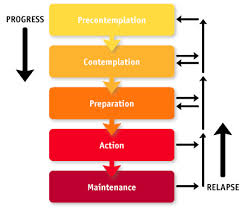Are You Ready to Make a Change?
We all know that making changes in our behavior can be difficult. Changing your diet or exercise patterns are common examples.
Medical researchers have come out with a model that describes your readiness to make behavioral changes. It's called the "Stages of Change" or SOC. In this model, the process of change is a series of stages:
Free PCOS Newsletter
- Pre-contemplation (unaware of problem and without intention to change).
- Contemplation (aware of problem and with intention to change).
- Preparation (planning for change).
- Action (implementing behavior change for less than six months).
- Maintenance (implementing behavior change for more than six months).

The stages of change describe change as an unfolding process, one that is fluid and does not necessarily move in a linear fashion from one stage to the next.
I bring this SOC model to your attention because it does a pretty good job of predicting outcomes. Take exercise for example. Almost all of us need to exercise more. We all know that. But if you're at the Contemplation or Pre-contemplation stage, it's not likely you're going to make exercise a regular habit.
However, if you can move on to the Preparation and Action stages, the probability of a new exercise habit is looking much better. If you reach the Maintenance stage, awesome! You have just changed your life.
The SOC is a gauge to measure how ready you are to make a change in your life. Pick an area of your life and ask yourself what stage you are now at.
Let's say you're at the Contemplation stage. Why not move on to the Preparation stage right now? Take some time to develop a plan to implement a change in your life.
Let's suppose you have low self-esteem. You see yourself as a freak. Nobody loves you. Nothing seems to go the way you want it to. But you understand your attitude is a problem and you want to do something to improve it. What is your plan to improve it? Maybe you can plan to notice when you're beating yourself up and immediately recite to yourself 3 things you are grateful for. Or maybe your plan would be to give yourself an act of kindness, such as a massage therapy session. Or something else.
If you have a plan, you can implement it. If you implement your plan, you change your behavior.
If you change your behavior, you create the life you want.
Keep these SOCs in your awareness and often ask yourself what stage you are at with a particular issue that's important to you.
If you can progress through the stages of change, medical research shows that you'll have a better chance of losing weight if you have PCOS.
Related Articles
- Acupuncture
- Diet
- Exercise
- Natural Medicine
- Nutritional Supplements
- Stress Management
- Return to Natural Therapies Index Page
Source: Jakubowski KP et al, Parents' Readiness to Change Affects BMI Reduction Outcomes in Adolescents with Polycystic Ovary Syndrome. J Obes. 2012;2012:298067
Get Answers to your Questions about
- Fertility
- Weight Control
- Hair Loss
- Stress
- Unwanted Hair
- Acne...and more!
FREE PCOS Report
and Newsletter

Your email is safe with us. We respect your privacy, and you may unsubscribe at any time.
Recent Articles
-
PCOS Long Journey to The Happy End
Apr 30, 18 07:24 PM
Hi Girls, Maybe my story will have one day a good end but I am not there yet. Until I was 31 years old I lived my dream, having lovely husband, good -
PCOS and Miscarriage
Apr 17, 18 04:03 PM
Proper diet and natural supplements can help the body maintain a pregnancy through successful delivery.
-
How to Deal with PCOS and Stress
Apr 04, 18 04:19 PM
Your body has a natural capacity to heal itself if you provide it with the necessary tools.





